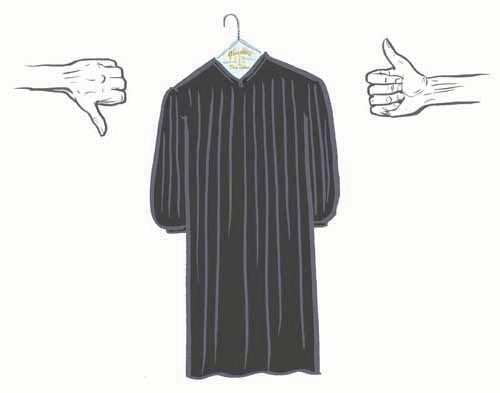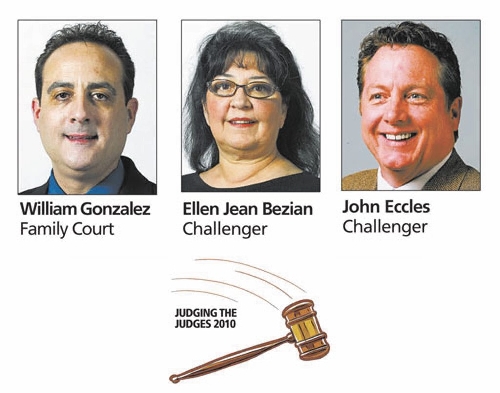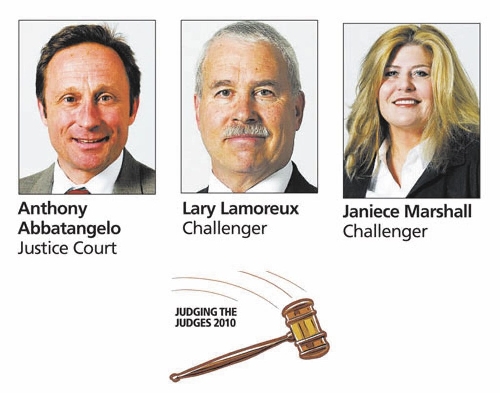Few sitting judges face challengers
Five jurists rated in this year's judicial survey are running in contested elections for judicial seats. The publication today of attorneys' recommendations whether they should be retained in office is intended to help voters decide whether to elect them again, or make some other lawyer a judge.
One challenger, John Eccles, pointed out that some of the races will be decided partly in the primary, and urged voters to participate even if not registered to either major party.
"A surprising number of people I meet, if they happen to be unaffiliated, don't seem aware that they can nevertheless vote on nonpartisan offices, such as judges," Eccles said.
The primary will be June 8, with early voting May 22 through June 4.
Jurists facing campaigns are William B. Gonzalez, Steven E. Jones, and Kenneth Pollock, all judges in the family division of Clark County District Court; and Las Vegas justices of the peace Anthony L. Abbatangelo and Karen Bennett-Haron.
One of them, Pollock, was recommended for retention as a judge by only 47 percent of the attorneys who rated him.
Nevertheless, the 45-year-old Pollock still will be a judge next year, whether he wins election or doesn't. He ran successfully for Family Court in 2008, and the seat he occupies is not up for another election until 2014; but he has filed for a new seat in the court's civil/criminal division.
Should Pollock lose his race for the new seat, he will retain his Family Court seat.
Pollock said he decided to run for the civil/criminal seat because a Nevada Supreme Court decision last year moved many legal issues from the jurisdiction of specialized Family Courts into that of the civil/criminal division.
"Dissolution of a marriage remains in Family Court, but the civil division has to do domestic partnerships. And sometimes a couple getting divorced will agree on some issue by contract, instead of in the decree. If somebody violates that contract, it has to be contested over in civil," Pollock said.
"We're going to have a lot of cases leaving here and going over there, and most of the judges there have no experience with that kind of thing. I looked at a move as reallocating the resources of the court, but the chief judge can't just assign you over to civil division; you have to be either elected or appointed."
However, several lawyers who rated Pollock criticized him for seeking the move.
One wrote, "This judge ran for the Family Court and one year later is seeking to win a seat on the civil/criminal bench. That displays a shallow respect for the court, and he should not be rewarded by winning a second election."
Of the 98 lawyers who rated Pollock, 54 percent said he was less than adequate on applying the law, rules of procedure, and rules of evidence, and ruling appropriately -- his worst scores.
Pollock also got mediocre grades -- 42 percent said he was less than adequate -- on familiarizing himself with cases and documents and fairly weighing all evidence and arguments, and on explaining the basis for his decisions.
Pollock said those scores mystify him.
"You would think if those things were true, my appeals would be through the roof. But of all the judges on this court, I had the lowest number of cases appealed in 2009, which was one case, and that appeal was later withdrawn."
Seeking the same civil/criminal seat is Susan Scann, who has practiced 33 years in Las Vegas and has concentrated in real estate, general civil law, and business litigation such as creditor rights.
This experience covers much of what the contested seat is expected to confront.
Scann also is an arbitrator and sits as an alternate municipal judge, and practiced family law for a decade.
"The issue my opponent is raising is that they need Family Court experience in the civil/criminal division.
"I feel the issue is who would make the better judge," she said, and added that issue is largely a matter of who has the most relevant experience. "I feel mine is better and broader and twice as much."
Another new Family Court judge, William B. Gonzalez, is in a three-way race to retain his seat.
Sixty percent of the 94 lawyers who rated Gonzalez said he should keep the job. About a third rated him less-than-adequate on core issues of appropriate rulings, correctly applying law and rules, and explaining his decisions. Yet, another third rated him more than adequate on the same questions.
He had good scores on questions about integrity, courtesy, and lack of bias.
Gonzalez, 48, was appointed to a court vacancy in 2009, and said he spent the five years before that representing juveniles in Family Court as a deputy public defender. He enjoyed working with children, and said he decided to become a judge because it would allow him to help them more effectively.
"As an advocate, my job was to ask the judge to do what the child wished, and that's not always what's best for the child," Gonzalez said. "You can try to lead the child to make a better decision, but once in court, you have to advocate for the one he has made. In this role as a judge, I can weigh all positions and do what I believe to be in the best interest of the child or the family."
As a public defender, however, Gonzalez didn't represent adults in divorce and custody cases, and some lawyers criticized him for bringing to the bench no experience in the Family Court's main business.
So did one of his opponents, Ellen Jean Bezian.
"I am running for a Family Court position because I have family law experience, unlike the judge I am running against," Bezian said. "If I'm a heart surgeon, I don't do cosmetic surgery, I stick to the heart.
"Somebody had to file against him and nobody did. That was the only reason I filed."
Another lawyer filed the same day, she noted.
Bezian, 62, is a sole practitioner who has concentrated on family law for 15 years. She worked in the gaming industry before getting her bachelor's and master's degrees at the University of Nevada, Las Vegas, where she later taught as an adjunct professor of English literature.
The other lawyer in the race is Eccles, 44, who has practiced in Nevada for a decade and concentrates on family law exclusively.
Last year, the Family Court picked him as a pro tem hearing master on juvenile delinquency, which means he hears cases when full-time court personnel are unavailable.
Eccles is associated with the firm of Trent, Tyrell, and Phillips.
Longtime Family Court Judge Steven E. Jones, who in some previous years had scores among the highest of jurists surveyed, drew a still-respectable 75 percent "do retain" on the 2010 survey.
Jones has drawn two opponents seeking to unseat him in this year's election.
This year, about 60 percent of the rating lawyers called him more than adequate on critical areas of doing his homework, ruling appropriately, properly applying law, and clearly explaining his decisions.
His worst score was on the criteria that "the judge's professional conduct is free from impropriety and the appearance of impropriety," where 28 percent rated him less than adequate, but a majority of 51 percent rated him more than adequate.
Comments written by individual lawyers make it clear this score reflects a well-publicized domestic violence accusation made by a girlfriend against him.
Jones was cleared because the woman recanted her testimony, and admitted inflicting the injuries, which were minor, upon herself.
Jones said recently he and his former accuser are again romantically involved, but no longer live together.
About 27 percent rated Jones less than adequate on being free from bias toward parties or attorneys appearing before him. He said the attorneys who down-rate him on that point are misinterpreting his actions.
"I mentor a lot of attorneys, mostly because there was nobody I could turn to when I was coming up myself. ... And maybe some others presume I'm going to favor those attorneys in court, but I'm not. My door is open, and any attorney can walk through it and talk to me about any case, as long as it's not my case."
One of the other candidates, Denise Ann Pifer, said, "I decided to run because I thought it was time for a change. When you take the bench as a Family Court judge, it carries moral and ethical obligations, and I think I am a better person to fulfill those obligations than the person currently in the seat."
Pifer wouldn't elaborate, however, explaining that Nevada's special rules for judicial campaigns prohibit it.
"We are held to a different standard," she said. "We cannot talk badly about our opponents in the way a candidate for governor could."
Pifer, 43, has practiced 15 years in Nevada, nearly all of that in family law. She has been active in pro bono work through Legal Aid of Southern Nevada.
Also in the race is Maria Maskall, 46, who has practiced in Nevada 13 years, and originally came here to clerk for Family Court Judge Dianne Steel, with whom she attended law school.
Maskall is a judge pro tem on the North Las Vegas Justice Court.
In 1999, with prominent attorney Bob Dickerson, Maskall published a paper pointing out that perjury committed in the courts of Southern Nevada, though a felony, was almost never prosecuted, and proposing to use judges' contempt powers to make sure perjurers don't get away with it entirely.
"I think people are paying more attention to it now than in the past," Maskall said recently. "There have been at least orders for contempt. I believe people in Family Court need to be responsible for what they say and would so hold them if elected. I would refer them to the DA's office for prosecution."
In Las Vegas Justice Court, Judge Karen Bennett-Haron was given a lukewarm 58 percent recommendation for retention by the lawyers who rated her.
Bennett-Haron, 48, declined to be interviewed for this story but did talk with reporter Frank Geary for a survey-related story about judges, including Bennett-Haron, who many criticized for failing to prepare for court, failing to rule properly or clearly explain their rulings.
Besides those issues, many lawyers questioned whether Bennett-Haron is free from racial, ethnic bias, or personal bias, or sufficiently courteous.
Bennett-Haron inspires confidence in some and its absence in others. The judge was rated less than adequate by at least 30 percent, on eight of the 12 characteristics by which judges are judged. Yet, more than 40 percent rated her more than adequate on each of the 12.
One lawyer's comment seemed to illustrate the collective ambivalence of the 167 who rated Bennett-Haron: "Judge Bennett can be patronizing, plays favorites, and has an apparent bias in favor of minority defendants, older people, and people who go to church. She is also obviously biased against government attorneys and law enforcement. ... Her mood swings are mercurial. Despite all that, she should be retained, because she is one of the few justices of the peace who will hold the State accountable in meeting its burden of proof, and she takes the time to explain her decisions. She is also excellent with defendants, including those who are incarcerated, taking the time to listen to them and to explain things to make sure they understand the system and the process. Justice is served in Judge Bennett's courtroom, despite her many biases."
Robert O. Kurth Jr. is running for the seat Bennett-Haron occupies.
Kurth, 42, has spent 18 years in general practice, which has carried him into Justice Court for initial appearances in felony cases and for misdemeanor trials, and for such civil matters as small claims, tenant-landlord disputes, and protective orders.
Kurth has been an arbitrator for the District Court, an alternate child support hearing master, and a small-claims court referee.
He claims endorsements by unions representing Metropolitan Police Department officers, police supervisors, and marshals who protect the court system.
"We need a judge who is going to protect our families, be tough on crime, and enforce the Constitution as well as the laws of Nevada," Kurth said. "I am going to be the type of judge who is not going to be legislating from the bench."
Las Vegas Justice of the Peace Anthony Abbatangelo, 45, faces two challengers, carrying in his baggage an evaluation not as fine as in previous years.
He received a respectable 71 percent recommendation that he be retained, but for years that score never dropped below 90.
Abbatangelo believes -- and comments lawyers added to explain their ratings seem to agree -- that the drop represents his conviction on a domestic battery charge.
"We simply should not have convicted criminals on the bench," one lawyer wrote.
Abbatangelo has apologized more than once for assaulting the woman, who was his wife then, and asked that voters judge him instead on 17 years of high performance.
More than half of all the lawyers gave him the highest of three possible scores -- more than adequate -- on every criterion.
His poorest score was on professional conduct, where 29 percent called him less than adequate.
Another 25 percent said he is less than adequately free of bias on the basis of parties or attorneys involved in actions he must judge.
One lawyer wrote, "His private life has not interfered with his judicial abilities."
One of his opponents, Lary G. Lamoreux, 58, asked voters to compare his 30 years of experience in private practice to the three Abbatangelo spent in his father's law firm before running for his first judicial seat, and the 17 claimed by candidate Janiece Marshall.
Lamoreux has some experience in criminal and family law, but now has a practice involving real estate, estate planning, and corporations.
"I deal with businesses, their employees, their customers, and their customers' complaints, the issues of real life," Lamoreux said. "And I think real life experience makes more qualification for being a good judge than years sitting on a bench."
He declined to criticize Abbatangelo or Marshall for anything, saying, "I want to give people something to vote for, not to vote against."
Marshall, 47, has practiced law in Nevada since 1993 and can claim relevant experiences before that. In 1990, she was the law clerk who assisted the U.S. District Court for Nevada in reviewing death penalty cases. Later, she was one of the lawyers who defended wrongful death lawsuits for the Las Vegas Police Department.
Marshall speaks Chinese and once worked with a Taiwanese law firm.
She said her wide-ranging legal experience results in understanding what's important in a court.
"You don't waste witnesses' time. You explain things to people who don't understand. And I'm not biased in anybody's favor. I'll bring those things to the bench," Marshall said.
"Your paper has documented the problems Abbatangelo has had, and I wouldn't have those problems. I think the judiciary should be held to a higher standard, and I'm willing to be so held. I'm running for the job in Department 3, simply because I think I'd make a better judge."
Contact A.D. Hopkins at adhopkins @review journal.com or 702-383-0270.
JUDGING THE JUDGES 2010
The results are in from the biennial survey in which lawyers rate Clark County judges.
TODAY
• What lawyers say about running incumbents
• How we evaluate judges | 23A
• Whose scores dropped | 24A
• Lawyers cut slack for new judges | 23A
MONDAY
• Nine should go, lawyers say
TUESDAY
• Do women judges get a fair test?
WEDNESDAY
• All is calm in Henderson Justice Court
THURSDAY
• It’s about knowing the law
FRIDAY
• Lawyers prefer appointing judges






















